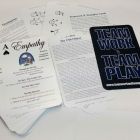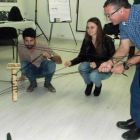Toggle Nav
- Shop Products & ServicesAll Categories
Posts
-
What's the right setting for delivering Experiential Learning content?
In the blog I wrote last month I tried to address some of the assumptions about experiential learning that seem to be getting in the way of people including elements of this approach in their programming. It seems that the most pervasive of these assumptions is about the physical spaces that are needed to deliver effective experiential content. To ... Read more...
-
Are your assumptions about Experiential Learning getting in the way of a breakthrough in performance?
 My friend and colleague Graham Cook is heading to Florida later this month where he'll be delivering a session at Training Magazine's 'Training 2024' conference and exhibition. His session is titled 'How to Design Behavioral Change Using Experiential Learning Activities'. I'm not going to be alongside him for this conference but that doesn't mean I...
Read more...
My friend and colleague Graham Cook is heading to Florida later this month where he'll be delivering a session at Training Magazine's 'Training 2024' conference and exhibition. His session is titled 'How to Design Behavioral Change Using Experiential Learning Activities'. I'm not going to be alongside him for this conference but that doesn't mean I...
Read more...
-
Continuous Professional Development for Focused Experiential Learning
 Most good trainers and facilitators I meet tend to have a strongly developed intuition about the needs of others. It doesn't take long for them to get to understand what will help a student to learn, and how learning material needs to be presented to make it easier for that learning to take place. As these trainers and facilitators become more ...
Read more...
Most good trainers and facilitators I meet tend to have a strongly developed intuition about the needs of others. It doesn't take long for them to get to understand what will help a student to learn, and how learning material needs to be presented to make it easier for that learning to take place. As these trainers and facilitators become more ...
Read more...
-
What's The Best Seasonal Gift You Could Give?
 It’s a question I often read around this time of year, and it inevitably provokes responses from extremes of opinion. There are those who go full-on consumerist and suggest expensive cars, jewellery, homes etc, ideas that are balanced by those who reject these ideas and suggest good health, happiness, close family etc.
So, as I&rsquo...
Read more...
It’s a question I often read around this time of year, and it inevitably provokes responses from extremes of opinion. There are those who go full-on consumerist and suggest expensive cars, jewellery, homes etc, ideas that are balanced by those who reject these ideas and suggest good health, happiness, close family etc.
So, as I&rsquo...
Read more...
-
How do facilitators work with groups who have had an 'easy win'?
 There were some interesting responses to last month’s blog which considered how to handle a session where your group are unsuccessful at completing the experiential task you have set them. For some people this was accepted as very sound advice, and it seems to have taken away some of the ‘fear of failure’ that was out there. ...
Read more...
There were some interesting responses to last month’s blog which considered how to handle a session where your group are unsuccessful at completing the experiential task you have set them. For some people this was accepted as very sound advice, and it seems to have taken away some of the ‘fear of failure’ that was out there. ...
Read more...
-
- Insights
- Clients
- Resources
- Company
- Switch Country


